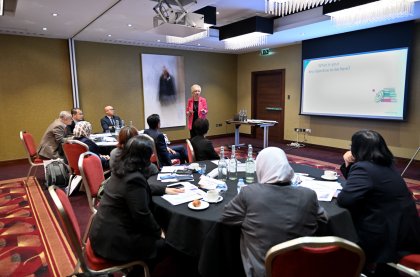Written by Ben Yardley, Learning Coordinator
The Challenge
Governments across the world are becoming increasingly conscious of the unique opportunities and risks posed by the information age.
The state of Sabah in Malaysia is no exception. Its government aspires to transform Sabah into a “Public Center of Excellence” in all things digital, as part of its Sabah Maju Jaya plan to develop the region. The first phase of the strategy includes the digitisation of public services, upskilling the population of Sabah and improving the collection of public data; in future, Sabah’s ambition is to improve governance by harnessing the power of big data, machine learning and artificial intelligence.
To achieve this vision, public sector leaders in Sabah need the know-how to bring innovation to public services. In short, they need to become digital leaders.
As Tom Bryant, digital consultant and AI expert, notes, digital governance is becoming a necessity. Generations raised with smartphones and growing up used to rapid advancements in technology will expect their government to be as digitally literate as they are. To engage their citizens and provide effective and accessible public services, public sector organisations must keep up.
The Action
Comprising seven days of expert lectures, study visits and interactive learning, Civil Service College developed a bespoke Data Science and Digital Leadership programme for a group of senior officials from the Sabah State Public Service. The content was wide-ranging, with an emphasis on both the current challenges faced by Sabah and on aspects of digital governance that Sabah aims to implement in future.
The programme began with an introduction to Learning Together, hosted by experienced Leadership Facilitator and CSC Associate Trainer, Maria Older. The group devised strategies and shared the challenges their organisations faced, and what they intended to take away from the programme. This was followed by a talk by Sir Philip Rutnam. Having been Permanent Secretary at both the Home Office and Department for Transport during his career, Sir Philip knows what it means to be responsible for digitally transforming a large organisation, despite not being a technological specialist himself.
Sir Philip drew on his experience of digital transformation in three major projects: turning the Driver Vehicle and Licensing Agency digital, using automation to improve efficiency at UK Visas and Immigration and founding the Centre for Connected and Autonomous Vehicles in 2015.
According to Sir Philip, what sets a successful leader apart is the ability to ask the right questions. An intricate understanding of exactly how the technology works is much less important than knowing how it can be used to contribute to your goals, and crucially, who to ask. Successful delivery of a project of this scale relies on a good plan, a good team and frequent proactive communication.
The next stage of the programme focused on tackling the digital challenges faced by Sabah. In classroom sessions led by Tom Bryant, a former Advisor to the Cabinet Office who has previously advised the neighbouring Malaysian state of Sarawak on digital transformation. After delving into some of the potential use-cases and real-world applications of artificial intelligence in government, the group explored the concept of Digital Leadership and the skills needed to successfully implement digital transformation.
Tom says, “Citizens want a seamless experience when engaging with their government—whether it’s paying taxes, renewing documents, or accessing social services. Governments that fail to adapt risk being left behind, as citizens increasingly demand the convenience and efficiency they experience in other areas of life. In the end, digital transformation in government isn’t an option—it’s essential for keeping pace with the expectations of the modern world.”.
The sessions focused on equipping the group with an understanding of the foundational concepts of artificial intelligence and how governments across the world can make the most of rapidly-changing technology to meet the demands of their citizens.
The Results
A common theme throughout the programme was the importance of “soft skills” in digital governance: effective communication, relationship-building and motivating your team. Being a digital leader is not just about your own technological expertise. It is about a willingness to listen, to remain curious and to do what is necessary to get the right people into the right positions.
The group also learned about the very practical organisational challenges faced by the public sector, mostly relating to pay and incentives. Although the UK has demonstrated in the last few years that flexibility in pay structure can help to attract and retain talent in highly sought-after areas, governments must recognise that they may not always be able to compete with the private sector on pay alone. Instead, they must look to other incentives in order to get the skills they need for digital transformation, whether learning and development opportunities, progression, offering interesting projects or fostering a strong sense of public duty. Digital leadership is as much about organisational culture as technical knowledge.

